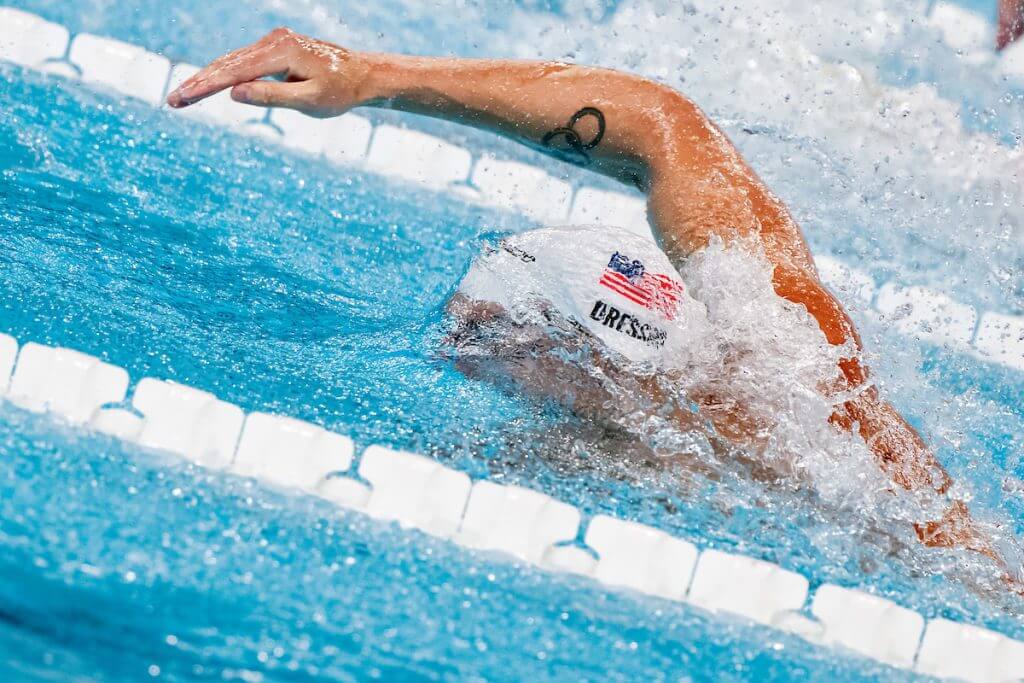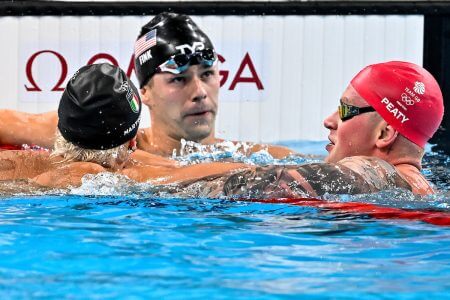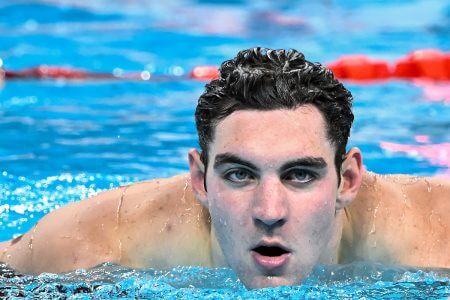An Analysis of How the American Men Struggled in Paris; How Close Were They to Additional Olympic Medals?

How American Men Struggled in Paris, Lost Out on Olympic Medals
This summer in Paris, the new stars of men’s swimming took their places atop the world. Leon Marchand was the most prominent of those stars with his four gold medals, all in Olympic-record time, while David Popovici, Pan Zhanle and Hubert Kos were among the new names to take their place atop the podium.
The stellar efforts of those men and others made life difficult for the U.S. men, who won gold on day one in the men’s 400 freestyle relay and in the final individual event, the men’s 1500 freestyle, with Bobby Finke, but not at all during the six days in between. The men finished with only six individual medals and went four full days of competition (days five through eight) without winning a medal at all.
Swimmers from Europe, Australia and elsewhere were too good — but the Americans did not exactly help themselves.
Following the U.S. Olympic Trials, the U.S. had a strong chance to reach double-digits in gold medals in swimming for the ninth consecutive Olympics and win 30 medals overall for the fourth consecutive Games, but that would require matching or improving upon their swims from Trials. The women largely achieved that ambition; on the men’s side, not so much.

Nic Fink (center) tied for silver in the men’s 100 breaststroke — Photo Courtesy: Giorgio Scala / Deepbluemedia / Insidefoto
The American men entered two individual swimmers in all 28 individual events contested in Paris. Of the 28 female entrants, exactly half improved upon their time from Trials in either the prelims, semifinals or finals. That’s a very strong success rate. But of those 28 men’s entries, only five swimmers improved upon their swims from Trials in any round in Paris — a brutal improvement rate of under 18% — and four of those swims resulted in medals. To reiterate, the U.S. men had only six podium finishes total. Sensing a pattern here?
Not surprisingly, two of the improvements came from Finke, who made a strong run at defending his gold medal in the 800 free before settling for silver in addition to his world-record-breaking swim in the 1500 freestyle. Nic Fink swam faster as he won silver in the 100 breast while Luke Hobson notched a best time on his way to an impressive bronze in a tight 200 free final. The only other improvement came in the men’s 400 free, where Trials winner Aaron Shackell swam a best time by one hundredth in prelims on his way to qualifying for the final, in which he finished eighth.
Carson Foster (400 IM) and Ryan Murphy (100 backstroke) each won individual bronze medals despite swimming slower than their Trials times, which would have been good enough for silver in each instance. However, both men missed out on medals they were capable of winning given their Trials times: Murphy stunningly missed qualifying for the 200 back final after swimming a then-world-leading mark of 1:54.33 at Trials while Foster ended up a tenth off the podium in the 200 IM while swimming a half-second back of his Trials performance.
Not only would both of those men have reached the podium with repeats of their Trials times, but so would their American counterparts, Keaton Jones in the 200 back and Shaine Casas in the 200 IM. Jones added three-quarters of a second on his way to fifth in his first Olympic final while Casas did not qualify for the 200 IM top-eight.
An up-and-down Olympics for Caeleb Dressel has been well-chronicled, with Dressel shining in relay action but struggling in his individual events. His Trials times in the 50 free (21.41) and 100 fly (50.19) were both faster than the bronze-medal-winning times from Paris.

U.S. sprinter Jack Alexy — Photo Courtesy: Giorgio Scala / Deepbluemedia / Insidefoto
Meanwhile, the busiest American man in the pool was Chris Guiliano, who joined the likes of Mark Spitz and Matt Biondi to qualify for the 50, 100 and 200 free events at the Olympics. Guiliano struggled on the international level, ending up eighth in the 100 free — his 47.25 from Trials would have earned silver — while missing the semifinals of the 50 and 200. His American teammate in the 100 free, Jack Alexy, also struggled on his way to a seventh-place finish in that event.
Joining Dressel, Guiliano and Alexy as medal favorites who faltered in Paris were Hunter Armstrong, Matt Fallon, Thomas Heilman and Chase Kalisz. Armstrong won bronze medals in the 100 back at the 2022 and 2023 World Championships and claimed gold at the lightly-attended global meet earlier this year. Fallon entered with the top time in the world in the 200 breast. Heilman, 17, was coming off a fourth-place finish in the 200 fly at last year’s Worlds. Kalisz was the defending Olympic gold medalist in the 400 IM.
None of those men qualified for an individual final in Paris.
Yes, the expectations that come with representing the United States in swimming at an Olympic Games are lofty, but perfection is not required to match the usual standards for success. Remember, a 50% success rate for the U.S. women is considered successful by any account. The men notched barely one-third of that.
We must also acknowledge that the level of men’s swimming around the world has improved significantly over the last decade. Thanks to that trend, not a single men’s winning time from the U.S. Olympic Trials would have been sufficient to claim gold in Paris, with only a colossal effort from Finke ending the golden drought.
But the gold-medal count only partially reflects the strength of a swim team; medal count matters, too, and when merely the inability to repeat performances left the Americans with their fewest overall medals in two decades, back when the Olympic program included three less events, the men’s meet can only be classified as a disappointment.
Matthew De George contributed reporting.




I thought there were about 20 women
A total of 46 American pool swimmers — 26 men and 20 women — qualified for the 2024
I agreed 💯 percent about the international athletes, being well trained with the Americans because of that international program and those coaches…
Like Bob Bowman, another American coach who trained Asian swimmers and AMERICANS is what the Americans are fighting against all odds, and it’s in ALL SPORTS…
But could the AMERICANS execute to their potential?!! Perhaps!!
I heard that COVID-19 had affected some of the men there: and that can affect their performance. And perhaps mental challenges got the best of them.
Or they just had a bad day too. They have to adjust to the weather as well… and also time change too..
And maybe they didn’t get the proper rest either, so there might be other factors, but I don’t have a clue whatsoever!!
Thank you for sharing your insights and point of view!!!